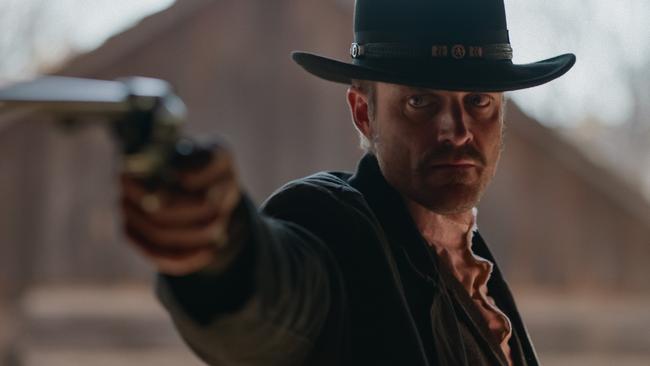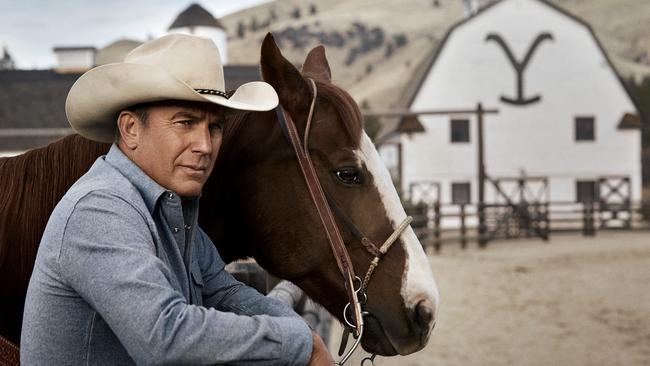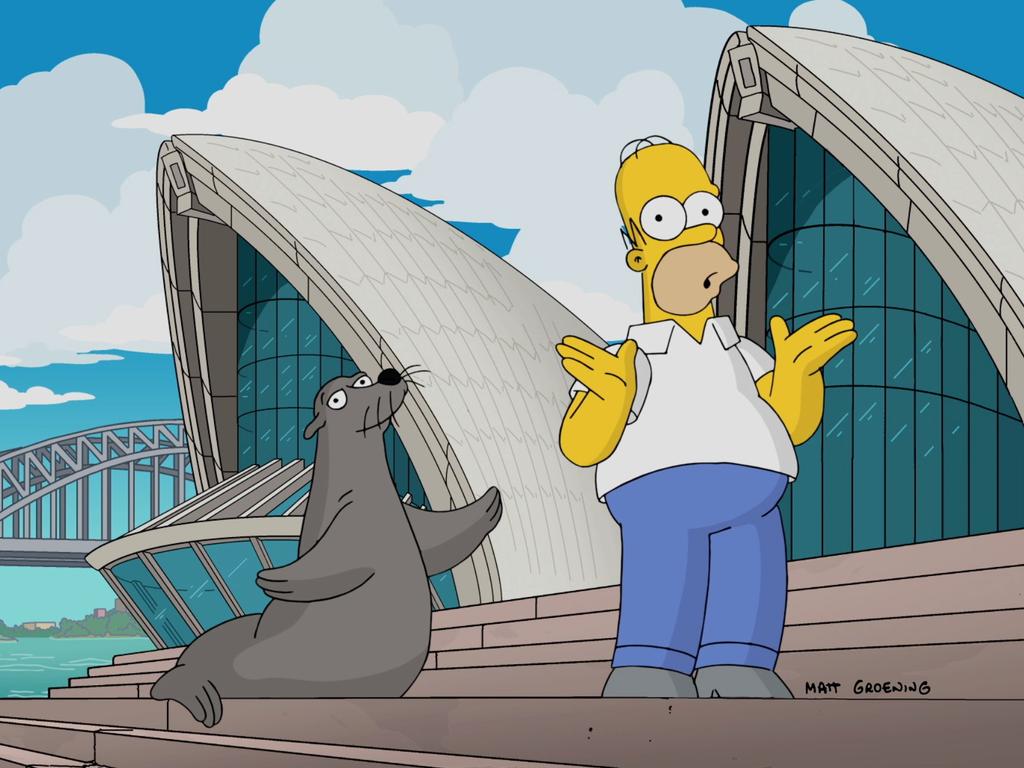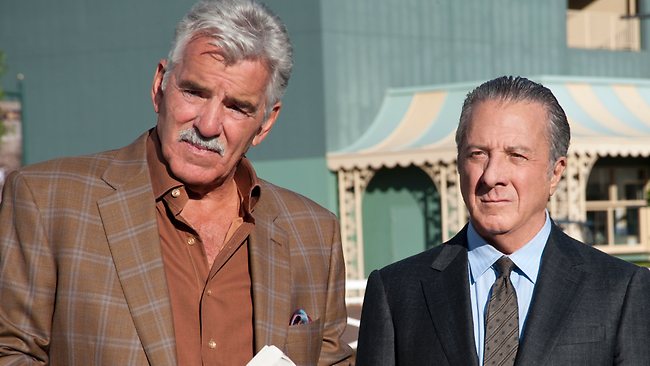Wyatt Earp rides again in this gritty docudrama
Wyatt Earp and the Cowboy War offers a mashup of fact and fiction to tell the story of the legendary lawman of the American old west.

The western, a formula dating back to James Fenimore Cooper, its history-embracing novels, radio programs, comic books, films and television shows, refuses to wander off into the sunset like a dusty old gunfighter. And since David Milch’s Deadwood, a new revisionist genre increasingly has found a home in this era of streaming TV.
Milch reinvented the western, channelling Herman Melville and Nathaniel Hawthorne, clothing fantasy with a profound verisimilitude and sordid realism. Set in the Dakota Territory in the 1870s, Deadwood dealt with mining, the Indian wars, territorial politics, rudimentary systems of justice, and criminality both mundane and monstrous.
The TV westerns that followed – some contemporised reinventions, including Justified: City Primeval, The English, Lawmen: Bass Reeves, Billy the Kid, Dark Winds and Taylor Sheridan’s Yellowstone and its prequels 1883 and 1923 – have regained the genre’s place as a kind of mythological notion. They engage many different interpretations but have in common storytelling emerging from a meeting point between savagery and civilisation.
The latest hit is Wyatt Earp and the Cowboy War, and it has been a winner for Netflix, coming from nowhere with little promotion but quickly hurtling into the streamer’s top 10 shows.
It’s a little different to anything we’ve seen before, making some bold assumptions about its subject matter in a quirky but highly entertaining style.
It’s from New York-based production company Stephen David Entertainment, which has had great success with TV docudramas, winning several Emmys for its shows. They include The Men Who Built America, The Making of the Mob and, in a partnership with Robert Redford, The American West.
Stephen David has forged a considerable reputation for his innovative use of the so-called hybrid docuseries concept, a type of documentary approach that combines traditional filmmaking techniques with a nonlinear method. It’s seen critically as a kind of mashup, often defined simply as “a blend of fact and fiction”.
Produced by David, Wyatt Earp and the Cowboy War is a six-part hybrid factual series combining tightly written fictionalised storytelling, a group of well-cast authoritative talking heads and highly cinematic re-enactments.
It’s the story of legendary lawman Wyatt Earp and how a famous gunfight not only defined an era but had repercussions felt throughout America. The show dramatises the way Earp’s story reflects the thin line between morality and the lawlessness that permeated America’s frontier communities.
What’s so different about the series is the way the re-enactments, instead of being largely abstracted fillers to plug holes in the narrative, actually comprise the story itself, the taking heads cleverly interpolated into the often-fierce action. The interview subjects are a gnarled bunch of highly rated Earp historians, authors of many books on the legendary lawman of the wild west, including Casey Tefertiller, John Boessenecker, Mark Lee Gardner and Paul Hutton.

Little-known director Patrick Reams and his cinematographer Jordan Lynn return us to the visual vernacular of the movie western epic and its old-fashioned scenic values. As in classic western movies, they give us an image of the west as a symbolic landscape that can lead to a kind of rebirth of heroic individual morality.
Tim Fellingham is the poker-faced, stoic Earp, with Ariel Eliaz and Shane Penhale playing his brothers Virgil and Morgan, while Edward Franklin is the consumptive Doc Holliday, the dentist turned gunslinger and friend of Earp.
And a good job they all do, too, with limited dialogue and parts written really as western archetypes. There’s not really a great deal of acting required; they just have to look convincing wearing a morning coat and carrying a gun. Mercurial Ed Harris is the narrator, and what a performance. He was also a central figure in HBO’s Westworld, which took place in a futuristic American old west-themed amusement park where human-seeming androids acted out the fantasies of the customers – every human appetite, no matter how noble or depraved, indulged.
In that show Harris, as he so often is, was a standout as the Man in Black, a gunslinger straight out of a Lee van Cleef movie, in a series its writer said was set at “the intersection of the near future and the reimagined past”, a highly inventive version of the new western.
An actor who can be trusted with a monologue, here Harris invests his narration with some free-flowing improvisation, obviously enjoying himself enormously.
There’s a short Netflix clip taking us behind the scenes as he records. “Basically, we just should have fun with it, right?” he says to a director. “Feel free to say anything to me, like ‘that sucked’ or whatever, you know.”
His narration, colloquial and intimate, pulls together the many strands of the somewhat complex narrative. He’s fond of what appear to be ad libs, such as “Now listen up” or “Let’s get one thing straight”, but that are cleverly written to allow us to catch up with a story that at times seems too fanciful to be true.
Earp, hero of both the dime novel and the modern literary and cinematic western, is a much-mythologised figure. As the series dramatises, he came to represent the western hero, a gunfighter who created his own methods of ensuring order and achieving justice.
Placed between the old violent life of the pioneers and the new civilised life that emerged as the west was conquered, he’s portrayed symbolically as taking responsibility for the destruction of the old life. But he’s also a revenge seeker who takes the law into his own hands, Harris telling us he was known for the beatings he dished out. A man famous in the frontier town saloons for his fists, Earp loved clobbering the bad guys.
“It wasn’t exactly by the book, but you couldn’t argue with the results,” Harris says.

The first episode, Trouble in Tombstone, takes us straight to the famous gunfight at the OK Corral, men in a small space shooting at each other without bothering to take cover. On one side are the Earps and Holliday and on the other the so-called Cowboys. The latter are members of the gang led by Ike Clanton, played menacingly by Jack Gordon, an infamous group of rustlers who had largely controlled Tombstone and the surrounding area without interference before the Earps arrived in town and Virgil became Tombstone’s marshal.
But the action is frozen after several seconds, the frame highlighting Earp. And Harris says, or rather shouts, “That guy right there, that’s Wyatt Earp, the toughest son-of-a-bitch in the West.”
We’re abruptly taken back seven months, to a robbery of a Wells Fargo stagecoach carrying $26,000 worth of silver that killed a driver and a guard. These stagecoach holdups become a national concern, given the importance of Arizona silver to the national economy.
The Earps are tasked to investigate and track down a gang member, one of the robbers, the snakeskin band on his hat indicating he is a member of the Cowboys.
And so we are led by Harris into a complex story involving the enduring resentments of the American civil war, the roles of Wells Fargo and businessman JP Morgan, and the British royal family worried about investing in such an unstable country. America needs to rid itself of violence for the new economy to flourish.
And it’s done with a soundtrack straight out of Sergio Leone movies with startling bursts of Italian opera to heighten the violence.
The plotting jumps around and the timeline can be a little confusing, though Reams effectively uses his rugged experts to justify the veracity of his extensive re-enactments. And at times there’s no clear distinction between hero and villain when it comes to Earp – it can seem like a myth in search of a man.
But Harris always turns up to anchor what becomes an increasingly complex piece of storytelling. And a very watchable one.
Wyatt Earp and the Cowboy War, streaming on Netflix







To join the conversation, please log in. Don't have an account? Register
Join the conversation, you are commenting as Logout